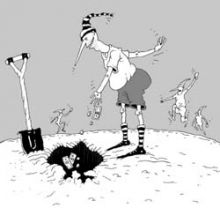The Ukrainian government has conducted the next stage of coordination with the World Bank on the conditions for granting a loan system in the amount of $250 million. Prime Minister Anatoly Kinakh on the eve of negotiations has acknowledged that the country’s budget has not gone through the best of times, so foreign credit would be very timely. Further, it hased already been scheduled in the plane state expenditures for this year.
But after negotiations it became clear that chances of extending credit up to the end of the year are unlikely. The chairman of regional representation of the World Bank in Ukraine, Russia, and Belarus, Luca Barbone has stated that the board of directors in the bank will consider the question on extending credit on December 19. “I cannot say that there are no chances of granting money in December, a lot will depend on Ukraine,” stated Barbone. As he said in order to receive the $250 million, Ukraine should have a quality budget for 2003 and also decide the problem of the current budget deficit in 2002.
A direct question is whether the World Bank wishes to assist Ukraine with credit in view of the present budget problems, Luca Barbone answered no less directly that the bank does not set itself such aims: “Granting a loan system is not connected in any way to any terms or the operative decision of any problems of the government.” Thus he has again made known that the bank wants to be sure of the reliability of the country’s budget system before lending. Incidentally, Luca Barbone has complimented the 2003 draft budget accepted in the first reading. He noted that the government has approached its development pragmatically; when the deputies set about the task they also found rather real sources of increasing planned treasury revenues. “If the budget will finally be accepted without significant changes, it will be possible to consider it well thought out,” announced Barbone, then gave hope for all the same positive decisions by the board of directors. Also he announced that the government has granted him a plan for the resolution of problems of the budget deficit, and it is quite satisfactory.
One more condition of the continuation of credit should be reforming of the privilege system. “If in the country, 43% of the population has various privileges, this speaks about the inefficient distribution of resources,” believes Mr. Barbone. His concern is quite clear, because actually the resources will be given to the World Bank. Also the bank expects a reduction of privileges to enterprises. However, the parliament is not going to refer to this until December.
Within the next few days leaders of the International Monetary Fund are expected to visit Kyiv, and the Ukrainian government will try to agree upon credit. The last time, the IMF pleased Ukraine with its loan over a year ago. Now there is talk about the beginning of a new standby program, providing step-by-step credit on the condition of fulfilling preliminary obligations by the borrower. And though Vice Premier Vasyl Rohovy has already noted that the purpose of negotiations will not be to receive loans, only the resumption of cooperation with the purpose of receiving a positive investment image.
After the week before last Jean Lemierre, president of the European Reconstruction and Development Bank, left Kyiv with the promise to think about resuming negotiations with the government concerning the renewal of joint credit programs, it has become clear that Kinakh’s words on behalf of the government about the reduction of foreign borrowing has been postponed until better times. The purposes of the October series of negotiations with the European Reconstruction and Development Bank, World Bank, and IMF, according to the government are the resumption of trust, free consultation, and other pleasures of dialog. Indeed everything goes to talks again because, “You need us to get the money.” And in this situation the Cabinet of Ministers has a will of its own. Despite the growth of treasury receipts by 17% in comparison with last year, this is still not enough to patch the hole in the budget. Judging by the pessimism concerning the acceptance of the 2003 draft budget in the first reading, this problem will be very serious next year.
Thus world friendship in relation to foreign credit is the guiding light of foreign economic policy for governments in the near future. The main result of this tendency, according to experience in recent years, is the dependence of the Cabinet of Ministers on accepting liabilities before western creditors. Meanwhile the EBRD, World Bank, and IMF limit themselves to indicating the objective risks of the budget system in Ukraine. But only they feel that the country, conventionally speaking, “has been on the credit needle,” undoubtedly, customs has appeared to demand the regulation of export-import separate goods in the interest of western companies. One can only rely on traditional uncompromising governments in talks on foreign economic questions.







